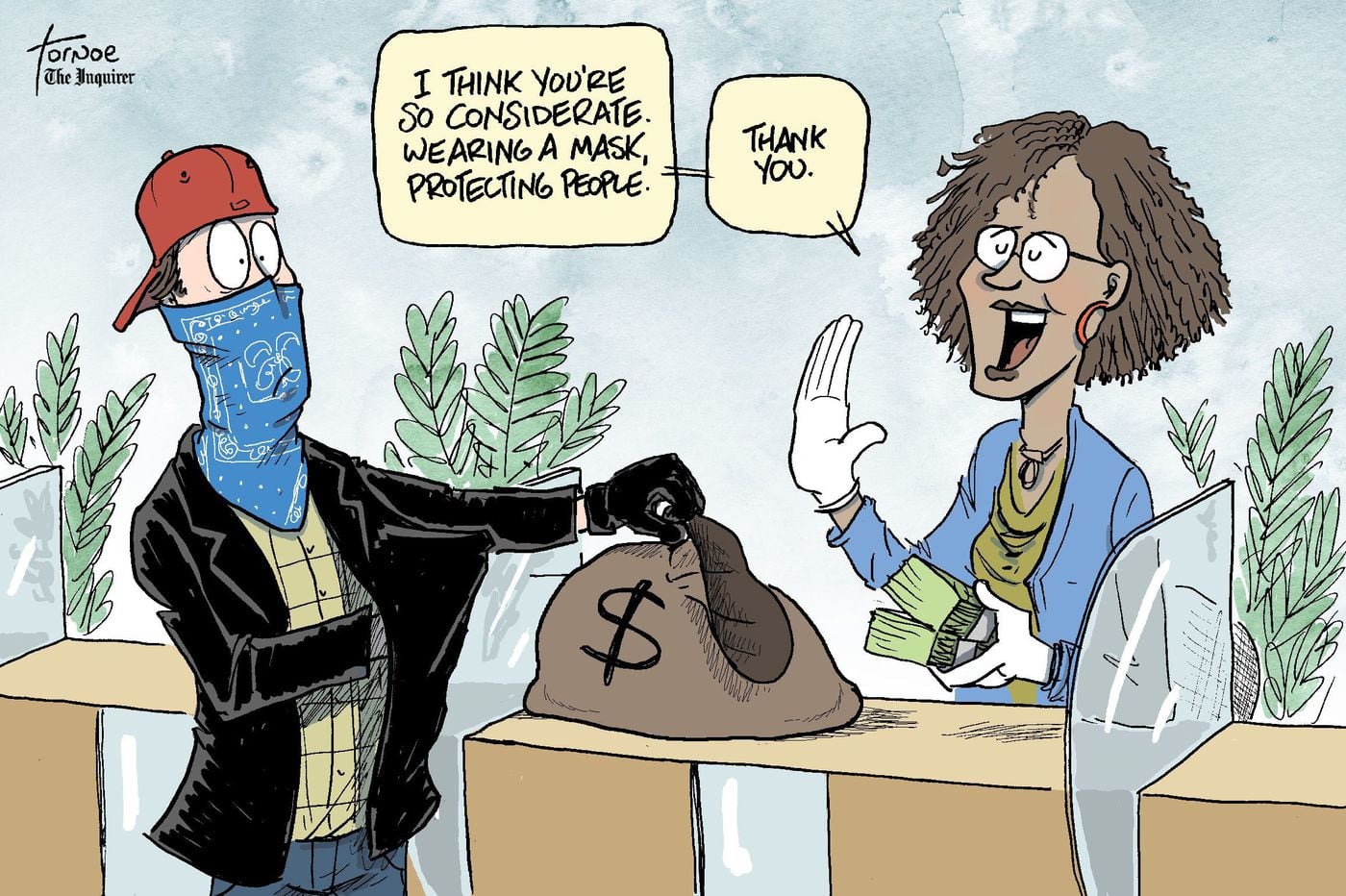"Getting Someone Sick" Is Not a Moral Failure
 |
| (Image courtesy of https://www.inquirer.com.) |
"Beloved, let us love one another, for love is from God, and whoever loves has been born of God and knows God" (1 John 4:7)."Beloved, let the Cautious and the Confident love one another by respecting one another's personal freedoms, for love is from God, and whoever loves has been born of God and knows God" (1 John 4:7, COVID-19 translation).
I recently read an article by Costi Hinn which has been the most beneficial piece I have read so far on the Christian's handling of COVID-19. I want to expand his ideas practically here. My main goal is to help Christians balance their differing responses and opinions to COVID-19 by appealing to mutual respect and freedom.
Hinn correctly labels three categories of people in his article. First, there are the Cautious. These people work from home, follow every guideline that the health departments puts forward, and are very cautious about re-assimilating to larger groups.
Second, there are the Confident. These people don't wear masks, don't mind being in close contact with others, don't feel obligated to follow every recommendation of the health departments, and generally think the crisis is exaggerated.
Third, there are the Cauti-dents. These people find themselves being a mix of the previous two groups, depending on context and situation.
Cutting right to the chase, I am certainly in the Confident category. I do not mind if others wear masks or if others stay home, but I will not be doing either of those, generally speaking. My job currently requires that I wear a mask, so I comply (and if the mask happens to slip below my nose... well, I believe in Providence!)
In my opinion, the trouble is that Confident people's freedoms aren't respected very often. They are viewed as an endangerment and menace to society, especially by the Cautious people. Let me be clear: the freedom that the Cautious people exercise in wearing a mask is the same freedom that the Confident people exercise when they choose not to wear a mask. However, this mutual respect is not given as often as it should be.
I must confess, I am guilty of looking down on the Cautious people at times. Just the other day, my students and I took a break from the classroom. We went outside and walked around the park, most of us free of masks, to get some fresh air. A student from a nearby college (where masks are required at all times, even when off campus) was walking down one of the sidewalks, wearing her mask, as my students approached. All of us were converging on the same crossroads. At this point, the college student stopped on her path, as some of my students were walking toward her. She started to head toward the other sidewalk, where she met another group of my students. Feeling trapped by this maskless army of selfish, unloving individuals, she hid behind a tree until we all passed. I stopped and watched as she peered out from behind the tree to make sure it was "safe" to proceed. When all was clear, she continued on her way.
Needless to say, I felt both troubled and upset by her behavior. Is this really where we are at, I thought to myself, where people are afraid of other people? But I concluded that it was her choice to behave as she did, and I must respect her decision as she was not sinning (even though a part of me wanted to rally my students and coral this girl just to see what would happen).
Before I go down too many rabbit holes, let me say this: some Cautious people view Confident people as unnecessary risk-takers, as endangering others, and even as threats to society (yes, that language is used). This is in part because they feel that if they were "to get someone sick," they would have committed a great evil. Let me explain.
Some Cautious people are following all the recommendations because they do not want to be responsible for getting someone sick. And, of course, they would feel a huge amount of guilt if they "got someone sick" and that person died as a result. This sort of thinking is weighty, to say the least. I would find it difficult to do much of anything for fear I might accidentally harm someone. But I would argue that this sort of thinking can slip into the sin of personal sovereignty fairly quickly; that is, that somehow you are in control and sovereign over the spread of the virus.
Here's my challenge to those who think this way: where in Scripture do we see sickness in the list of sins that are harmful, dangerous, selfish, and evil? Where do we see sickness listed as a sin at all? My point is this: "getting someone sick" - the act of passing on a communicable disease, either known or unknown - is not a moral failure. It is not a sin.
Wisdom, of course, would demand from us that we not continue life as normal if we or our kids are sick. We should stay home and rest in order to recover. Living in such a fast-paced world puts tremendous pressure on us to keep up with all our to-do lists even when we're sick, but wisdom would tell us that sickness is a time to rest. I have found in the times when I have been sick that the Lord used it to make me slow down and to rely on him. God has used sickness to draw me closer to him during my time of rest. Praise God!
What am I trying to accomplish by writing this article? I am trying to say this: that Cautious people need not feel the dread of impending guilt if they "get someone sick." Getting someone sick is not a sin; getting sick is the result of a fallen body living in a fallen world. The type of sickness we are talking about is not the result of living an immoral lifestyle (although some wrongly might argue that if we leave our homes or go somewhere without a mask we are living immorally). Now, if I contract a transmissible disease through immoral living (such as an adulterous, sexual relationship) I believe I have a responsibility to abstain from other forms of this sort of behavior because the very behavior is sin! An STI is not a sin, but the manner in which I got it is a sin. However, getting sick from a virus like COVID-19 is not the result of someone else's moral failure; it is the result of living in a fallen world.
Wasn't this common knowledge just a few months ago? "Everyone will get the virus eventually," was what all the reports were saying. "We just don't want to overwhelm our hospitals, so let's try to slow the spread, flatten the curve." Haven't we, together, done this? Are our hospitals overwhelmed? None are to my knowledge, at least in my area. On top of that, if someone exercises their freedom to wear a mask and they believe it is effective in warding off sickness, then me not wearing one, while exercising my freedom, won't be creating any sort of threat to your wellness.
All I ask is that Cautious people and Confident people show each other some mercy; neither one of us is better than the other. I think by living according to this sort of "COVID grace" the body of Christ can be diverse and successfully united at the same time. Therefore, let us respect one another by allowing for freedom of thought and practice in issues that fall outside biblical commandment.
Wisdom, of course, would demand from us that we not continue life as normal if we or our kids are sick. We should stay home and rest in order to recover. Living in such a fast-paced world puts tremendous pressure on us to keep up with all our to-do lists even when we're sick, but wisdom would tell us that sickness is a time to rest. I have found in the times when I have been sick that the Lord used it to make me slow down and to rely on him. God has used sickness to draw me closer to him during my time of rest. Praise God!
What am I trying to accomplish by writing this article? I am trying to say this: that Cautious people need not feel the dread of impending guilt if they "get someone sick." Getting someone sick is not a sin; getting sick is the result of a fallen body living in a fallen world. The type of sickness we are talking about is not the result of living an immoral lifestyle (although some wrongly might argue that if we leave our homes or go somewhere without a mask we are living immorally). Now, if I contract a transmissible disease through immoral living (such as an adulterous, sexual relationship) I believe I have a responsibility to abstain from other forms of this sort of behavior because the very behavior is sin! An STI is not a sin, but the manner in which I got it is a sin. However, getting sick from a virus like COVID-19 is not the result of someone else's moral failure; it is the result of living in a fallen world.
Wasn't this common knowledge just a few months ago? "Everyone will get the virus eventually," was what all the reports were saying. "We just don't want to overwhelm our hospitals, so let's try to slow the spread, flatten the curve." Haven't we, together, done this? Are our hospitals overwhelmed? None are to my knowledge, at least in my area. On top of that, if someone exercises their freedom to wear a mask and they believe it is effective in warding off sickness, then me not wearing one, while exercising my freedom, won't be creating any sort of threat to your wellness.
All I ask is that Cautious people and Confident people show each other some mercy; neither one of us is better than the other. I think by living according to this sort of "COVID grace" the body of Christ can be diverse and successfully united at the same time. Therefore, let us respect one another by allowing for freedom of thought and practice in issues that fall outside biblical commandment.
"It's ok to be different" (Costi Hinn).




Comments
Post a Comment